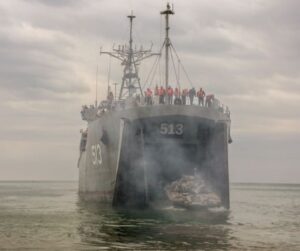Iranians have become the premier pirates of the Persian Gulf. Burnishing its image as the number one pariah in the Middle East, the Islamic Revolutionary Guard Corps Navy (IRGCN) illegally seized two oil tankers transiting international waters between the Arabian Peninsula and Iran. The first incident occurred on April 27, when IRGCN fast attack boats, small PT boat-type watercraft, harassed and then seized Advantage Sweet, a Marshall Island-flagged, Greek-owned vessel bound for Houston, TX. The attack and capture of the ship took place in the Gulf of Oman in international waters.
US Navy Describes Piracy by Iran
A US Naval Forces Central Command (USNFCC) issued a statement condemning Tehran’s act of piracy in international waters:
“Iran’s actions are contrary to international law and disruptive to regional security and stability … In the past two years, Iran has unlawfully seized at least five commercial vessels sailing in the Middle East.”
According to a Wall Street Journal report, Iran seized Advantage Sweet in retaliation for the US commandeering an oil tanker carrying Iranian crude oil to China in violation of US economic sanctions against Tehran for its nuclear weapons development program. That crude oil was intercepted and redirected toward a port in Texas. Officials with knowledge of the incident explained:
“[T]he U.S. Justice Department had obtained a court order to seize the Suez Rajan tanker, operated by Athens-based Empire Navigation. Brokers in Singapore said the ship had been idle for the past three months, but it departed in early April and switched off its automatic identification system on April 22 when it was off Madagascar. The brokers also said the ship is now en route to Houston.”
On May 3, Iranian IRGCN vessels seized a Panama-flagged tanker, the Niovi, on its way through the Straits of Hormuz. In the video released by the US 5th Fleet, small Iranian fast boats can be seen forcing the Niovi into Iranian territorial waters. It is unclear what prompted the illegal action other than the IRGCN demonstrating that it could.
It seems Iran wants to flex its muscles by challenging the US presence in the Persian Gulf region. Not long ago, Iranian naval vessels attempted to steal the Navy’s surface drones. Navy ships in the area acted rapidly and forced the IRGCN to return the unmanned watercraft. Taking on the US Navy could have unanticipated consequences. Such behavior is a dangerous gambit for Tehran leadership.
Iran Should Take a Lesson from History

(Photo by Iranian Army / Handout/Anadolu Agency via Getty Images)
Iran and the United States should recall when the IRGCN attempted to mine the Gulf and disrupt marine traffic, particularly crude oil movement, through the Hormuz Strait in the 1980s. Because US law prohibited the use of naval ships to protect civilian commercial vessels flagged by foreign nations, President Ronald Reagan re-registered Kuwaiti ships as US-flagged in Operation Earnest Will. Despite the re-flagging, Iran continued to mine the Gulf waters and harass shipping.
On April 14, 1988, off the coast of Bahrain, the USS Samuel B. Roberts hit an Iranian mine, causing injury to ten sailors. US retaliation was swift and devastating. Naval forces attacked the Iranian frigates Sabalan and Sahand, seriously damaging the former and sinking the latter. In all, the Iranians lost one frigate (45 crew killed), one gunboat (11 crew killed), and three speedboats, with one frigate damaged and two oil platforms destroyed. The Iranians should consider that a similar US response could happen again. Will the Biden administration take its cue from Reagan’s Earnest Will operation?
All opinions expressed are those of the author and do not necessarily represent those of Liberty Nation.
Do you have an opinion about this article? We’d love to hear it! If you send your comments to [email protected], we might even publish your edited remarks in our new feature, LN Readers Speak Out. Remember to include the title of the article along with your name, city, and state.
Please respect our republishing guidelines. Republication permission does not equal site endorsement. Click here

